In Madagascar, deforestation is becoming more serious as the population increases, leading to land degradation and putting people's livelihoods and production activities at risk. We took a close look at activities aimed at curbing this problem by giving residents technical skills through training that is open to all.
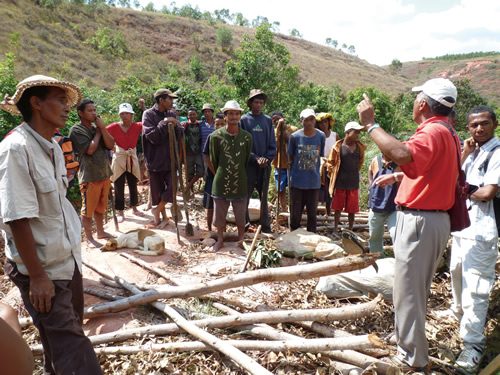
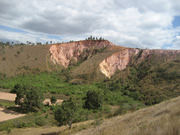
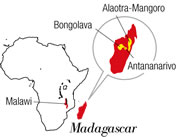
The locals call the soil resulting from the earth collapsing and coming off the mountainsides "lavaka" (top photo). Residents participated in practical training and learned how to make fences to prevent it.
From "Charity" to "Participatory Development"
Madagascar, which has 1.6 times the land area of Japan, is home to 250,000 kinds of wild fauna and flora, with around 80% of them being endemic. In this country known for its rich ecosystem, trees are disappearing. The causes for this include cultivation of farming land and slash-and-burn associated with a rapid increase in the population, as well as logging for fuel. More mountains are getting bare, particularly in the Central Highlands, which lie upstream, and the earth is collapsing everywhere, resulting in "lavaka," which means "hole" in their local tongue.
Many of those who live in the upstream region are already poor. The sediment spilling down from the surface of the mountains as a result of lavaka covers cultivated land, water sources, and roads, making it even more difficult for the residents to engage in rice farming and other production activities, and threatening their livelihoods. The large volume of sediment travels down the river and even spreads to rice-producing districts downstream.
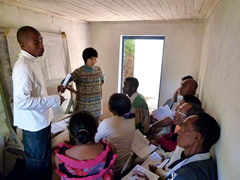
Miura (woman in the back) meeting with local trainers. Residents who complete the training course to be a local trainer are awarded certificates.
Since 2012, JICA has been implementing resident-led projects in the Alaotra-Mangoro and Bongolava regions in the Central Highlands for the purpose of soil conservation and developing a system for activities to improve livelihoods. "Conventional aid from other donors consisted mostly of providing money for soil conservation and planting trees by residents in pre-determined places," explains Hiroko Miura from IC Net, Ltd who works as a project manager. "Such efforts are not led by residents, and they do not help promote understanding of the problem. Moreover, there is also the issue that when you just teach certain people the necessary skills for planting trees, the skills do not spread. That's why we decided to spread these skills through training that is open to all. This motivates them to continue planting trees and implementing countermeasures for lavaka where needed."
The skills taught include planting trees on bare slopes, making improved ovens to reduce the amount of firewood or charcoal used, creating countermeasures for preventing the spread of lavaka damage, and cultivating lychee and raising freshwater fish to improve livelihoods. Up to now, the training has been carried out more than 8,500 times in eight municipalities in the two regions, with the number of participants totaling more than 140,000. Miura recalls the background of the training, "We focused on developing a model for implementing training that would spread the information and skills to all residents."
Creating a Useful Training Model
The model for implementing the training has three layers consisting of persons responsible for implementation, on-site management, and local training. The persons responsible for implementation are from a branch office of the Ministry of Agriculture or the Ministry of Environment or from a local NGO. They decide on the skills to spread within each municipality based on the needs of the residents. Staff members assigned to each municipality supervise the training on site, while more than 800 local trainers, who have been trained from among the residents, let the people in their respective villages know that the training will be held and have the role of teaching the skills. Village residents with the relevant know-how, such as people who had been taught the skills in past projects, served as instructors when training local trainers. By utilizing local human resources to communicate information and develop capabilities, all residents were able to get involved.
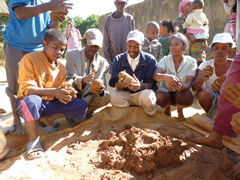
Training on how to make improved ovens
Under the instruction of the local trainers, the residents acquired skills ranging from creating seedbeds for tree planting to planting pre-grown seedlings on mountains. On the other hand, during training on how to reduce the damage from lavaka, residents who believe that lavaka is the work of God are shown videos to help them understand that the damage can be mitigated and that those who have suffered damages are tasked to procure the materials necessary for the countermeasures. Practical training was provided on making earth-retaining fences before the rainy season. Miura says, "The residents who have seen the effects of the fences they installed build some more after the training. They're built using materials around them, so another advantage of this model is that the residents are able to maintain and manage on their own, and continuity of activities is high."
As a result of the training, in a span of four years, 2,380,000 trees were planted, earth-retaining fences were installed in more than 100 locations, 21,000 improved ovens were made, and 23,000 lychee plants and more than 120,000 fingerlings were produced. The residents say that they are happy because everyone has an equal opportunity to learn the skills, and these skills are useful to those who are truly hurting, as opposed to aid that has previously been given. One resident said that he did not own land and thus had been of low status in the village, but by becoming a local trainer and working hard for the village in getting everyone to participate in the training, he earned the trust of the other residents and was elected as a local councilor in the municipal elections.
Miura and her project team's approach was developed based on the actual circumstances of the local area and consists of making full use of local human and natural resources, spreading simple skills that the residents can implement through training that are open to all, and conducting follow-up to ensure that the skills take root. The approach is now being incorporated by projects implemented by other development partners within the country.
Effectiveness Also Demonstrated in Farming Villages in Malawi
A project based on the same concept is also being carried out in Malawi since 2013. In a rural area near the country's leading commercial city of Blantyre, uncontrolled deforestation and raising of crops not suited to the topography have caused a decrease in soil water retention, bringing about soil erosion during rain and resulting in decreased yield. The aim of this project is to promote tree planting, silviculture, and environmentally friendly farming among farmers.
In past projects of this kind, a very small number of farmers would be taught the skills, and those selected farmers were expected to spread the skills to many other farmers. The concept behind this project is the opposite, however. Three of Malawi's government ministries, including the Ministry of Environment, trained about 3,000 farmers to be trainers in the target villages by the end of last year. Each of them is responsible for 15 nearby farming households to ensure that the skills spread throughout the villages. The farmers learn things such as how to increase rainwater retention and penetration and how to prevent soil erosion by determining the direction, length, and spacing of ridges along contours. They put the skills to use right away in their own fields and continue doing such efforts.
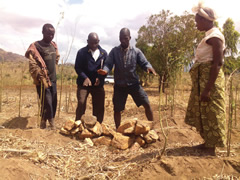
Farmers in Malawi gathered rocks to make a check dam in order to reduce soil erosion from cultivated land on a steep slope. The effect of each small handmade check dam is limited, but it can be increased by having residents cooperate to build a large number of them.
Based on the results in both of these countries, Masato Onozawa who works as a project manager for IC Net, Ltd. says, "Achieving similar results for a specific method in diverse African societies beyond national or regional boundaries has provided a valuable precedent." This training, which give equal opportunity to learn skills and promote understanding of local challenges among residents to help solve them, protect the forests, soil, and livelihood of the people who live there.




scroll